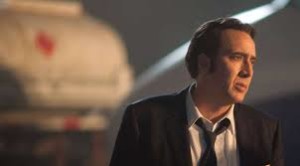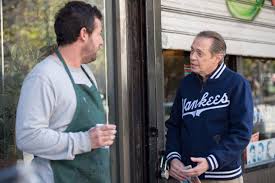Netflix’s recommendations have long been a source of amusement and morbid curiosity, deploying complex algorithms (or possibly just straight-up sales pitches) to come to unlikely conclusions about your personal preferences.
Did you enjoy the “cerebral, imaginative” World of Tomorrow? Why not check out its obvious spiritual prequel … Stanley Kubrick’s The Shining! Are you a fan of 2015’s technically groundbreaking, exuberant, visceral, and touching Tangerine? Just move on over to Consinsual, a dubious looking film about a “couple who seem to have it all pushing their sex life to the edge.” It’s like it’s the same movie!
In a previous entry in this series – a concept stolen wholesale from the great Nathan Rabin, by the way – I shelved my skepticism and allowed Netflix to guide me. It didn’t go well. As it turns out, the charming Easy A does not, in fact, pair comfortably with the gutter-trawling shittiness of Chris Columbus’ adaptation of I Love You, Beth Cooper … unless by this we mean, “Makes one appreciate the charming Easy A,” in which case, mission accomplished.
I thought I’d give it another try. But with a twist: since starting with a movie I enjoyed didn’t deliver the goods, maybe I should begin with one I did not.
And this how I ended up watching both The Cobbler and the Nicolas Cage-starring entry in the Left Behind series, on a dark, bewildering January day, in this year of our Lord, two thousand and sixteen.
The Cobbler, of course, is the most celebrated movie Tom McCarthy made in 2015, nominated for several Oscars for its ensemble cast and searing insight into child abuse cover-ups in the Catholic Church and the intrepid reporters who broke the story. Wait … no, that’s Spotlight, his other 2015 movie. The Cobbler is the intermittently racist movie in which Max Simkin (Adam Sandler) wears magic shoes to fight gentrification, and also apparently have sex with his mom while pretending to be his dad, so she can die happy.
It is not a good film.
McCarthy has to top some list of directors, releasing his most acclaimed and most reviled movies in the same year. If Spotlight scores big at the Academy Awards, perhaps most will forgive him for the confusion and emotional trauma of The Cobbler. I, for one, will never forget.
Leaving aside the squickiness and near-complete tonal incompetence of this Adam Sandler vehicle, it has one certain thing going for it: it’s never boring. (Neither are car crashes, but the point stands.) This is not something that can be said of Left Behind, a film Netflix thought I might also like, thanks to my Cobbler-related enthusiasm.
Left Behind is the latest entry in the evangelical Christian series about the Rapture, based on the terrifyingly popular books by Tim LaHaye and Jerry Jenkins. I have not read those books, as I am not insane, nor have I seen the previous films, which both starred fleshy humanoid boil Kirk Cameron, famous for his role on “Growing Pains”, for winning the War on Christmas with discussions in a parked car, and for being a complete and total dick all the time.
None of this sounds promising, I grant you, but … it has Nicolas Cage! An over-the-top film about a world ravaged after God has selected his chosen people and sucked them up into Heaven, starring fucking Nicolas Cage as a passed-over pilot attempting to do right in a world gone mad? This couldn’t possibly be uninteresting!
Oh, but it could, and it is. The Lord works in mysterious ways.
Cage stars as the wonderfully-named Rayford Steele, a top-notch pilot, implied womanizer, and bad father to his daughter Chloe (Cassi Thomson), whose name we know because everyone keeps repeating it as though they are worried they might forget. Steele’s wife Irene (a very sad Lea Thompson, who may be thinking of the coming turmoil or, instead, may be thinking about how she’s in a movie where’s married to a guy named “Rayford”) has recently found God, and pretty much freaked the family out with the fervency of her devotion and her unwillingness to talk about anything else. Hell, you’d probably want to bang the flight attendant too, if you were a womanizing pilot named Rayford Steele!
But the joke’s on him (and much of the world’s population), when suddenly, inexplicably people vanish in an instant all across the globe! While he’s in mid-flight, his co-pilot and many passengers vanish — the rest are just … left behind. Now, with the world on fire, with deep moral questions abounding, and most importantly, with no place to land and not enough fuel for the plane, the heathens must save themselves, in this, our darkest hour.
Rayford Steele isn’t in it alone, though – he has help not only from Chloe (“Chloe!”) on the ground, but also from the equally wonderfully-named Buck Williams (Chad Michael Murray, inheriting the role from Kirk Cameron, noted festering wound masquerading as a person). He’s an apparently famous reporter on board the plane, who also happened to fall in love with Chloe (“Chloe!”) at the airport, when he saw her make a crazy old lady feel stupid. (Classic Chloe.) The odds are stacked against our team of repentant sinners and temporarily doomed unbelievers, but they just might have a shot ….
This is actually not the worst plot ever, which is one of the many strange aspects of Left Behind. If we get past the milleniarian nuttery of its set-up, it reads a lot like an action movie in which casting Cage would make perfect sense. There are even moments when various people’s crises of faith generate some interest, and there’s a narrative lurking just below the surface about the compassion and resilience of ordinary people under extraordinary, existentially-fraught circumstances. It could’ve been Non-Stop: The Reckoning, if that narrative had somehow muscled to the front.
But, no. That narrative, unfortunately, stays way in the back, buried well below the surface of a movie that can’t decide if it’s Evangelical propaganda or Con-Air. At all the places the tension should mount, confusion does instead. So does unintentional comedy.
For some reason, for instance, Jordin Sparks is there. The American Idol contestant plays an unhinged passenger who assumes the disappearance of her Heaven-bound child is a plot by her basketball-playing husband, and seizes a Rapture’d air marshal’s gun to threaten the people she considers his accomplices. A belligerent little person squares off with a Muslim man, with predictably inappropriate comments bandied about on all sides. It’s a situation that involves a whole lot of Buck Williams speeches, which are exactly as thrilling as they sound.
And all this time, Cage is in the cockpit, coordinating an emergency landing with his daughter. Chloe (“Chloe!”) almost jumped to her death earlier in despair, but was saved by a) a cell phone call, and b) the sudden inclusion of an explicitly religious song on the soundtrack, which I assume she must’ve been able to hear, too.
Deciding, thanks to unexpected cell phone reception and extremely awful country music, to soldier on in this fallen world, she takes it on herself to clear a makeshift runway for her father’s damaged plane, clearing debris with a series of commandeered vehicles that would not, in fact, clear very much debris in real life. But no matter: the debris is really a metaphor for all the things that stand between her and a meaningful life in Jesus Christ – or between her and forgiveness for her dad missing her birthday, or between her and her mom, who was super right about how God’s going to kill everybody — so she steals a bunch of cars and just runs that shit over, like the Bible says you should. It’s all about family and faith.
Which brings us back to The Cobbler. Like Left Behind, McCarthy’s 2015 misfire also dealt with faith, family obligations, and age-old prophecy, and like Left Behind, it did so in the clumsiest ways possible, though with significantly more shoe metaphors. Considering Netflix’s logic, it becomes clear that both films are Biblical in their pronouncements, in a sort of deeply stupid Old vs. New Testament kind of way. Both are about the possibilities for growth and change lurking beneath the trappings of everyday life, if we would just wake up and recognize the Invisible Powers. And both are terrible.
But viewing them back to back reveals something else: they’re both deeply confused about what sort of film they want to be. Is The Cobbler a comedy? If so, why is it so unfunny, and so seemingly committed to its unfunniness, and why is Adam Sandler so sad, and why does he fuck his mom, maybe? Is Left Behind an action movie? If so, why is it so boring, and Nicolas Cage so serious? Why do you cast Sandler and Cage in roles they could conceivably make at least arguably entertaining by just doing their regular thing, and insist instead that they mope around, depressed shadows of their own personae?
These are mysterious questions, and I won’t pretend to offer an answer. Only God — or his team of shape-shifting, Oedipal boot magicians — knows for sure.
Did I enjoy Left Behind, based on my weird fascination with The Cobbler? No. If anything, it made me appreciate the utter absurdity of McCarthy’s strange ode to working class, magical Jews and their fabled ability to “walk in someone else’s shoes” all the more.
But at least this time, I see the connection, tenuous as it may be. In a world that demands action but withholds instruction on how to act, we do what we can. But we still might, like some sort of Max Simkin or Rayford Steele, find ourselves adrift, searching for meaning, or a method, or a Method Man, or a place to land a plane full of insufficiently contrite stereotypes. It’s a strange world.
What can you do in such a world, except care for those you love, and occasionally change shape and form so as to better accomplish this goal, and frequently yell your daughter’s name into a cell phone that isn’t working, because God smited it?
These are truly things to ponder. The world is full of mystery and boredom and totally inexplicable developments, and this is something Netflix knows. We understand what we can, and have faith in that which we cannot.





